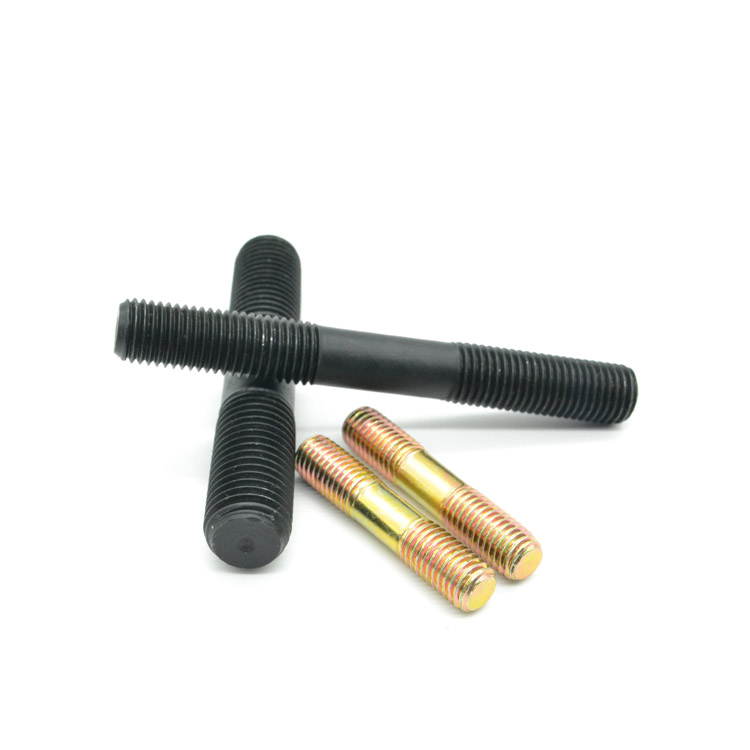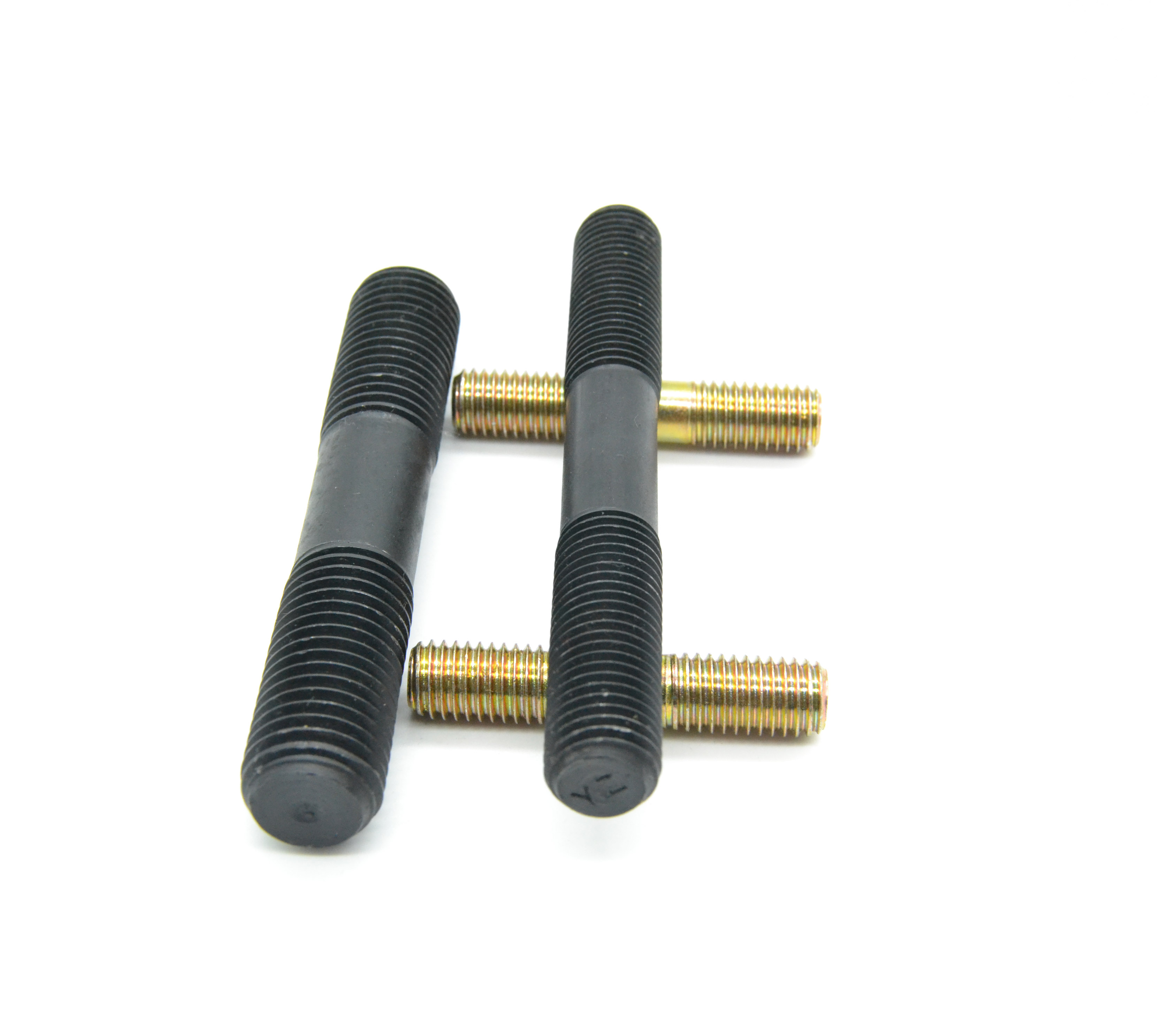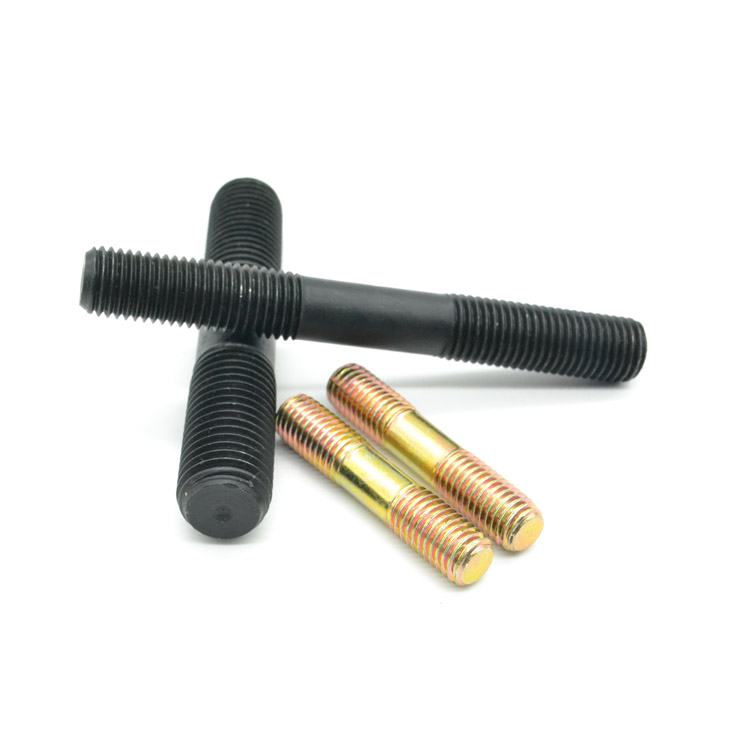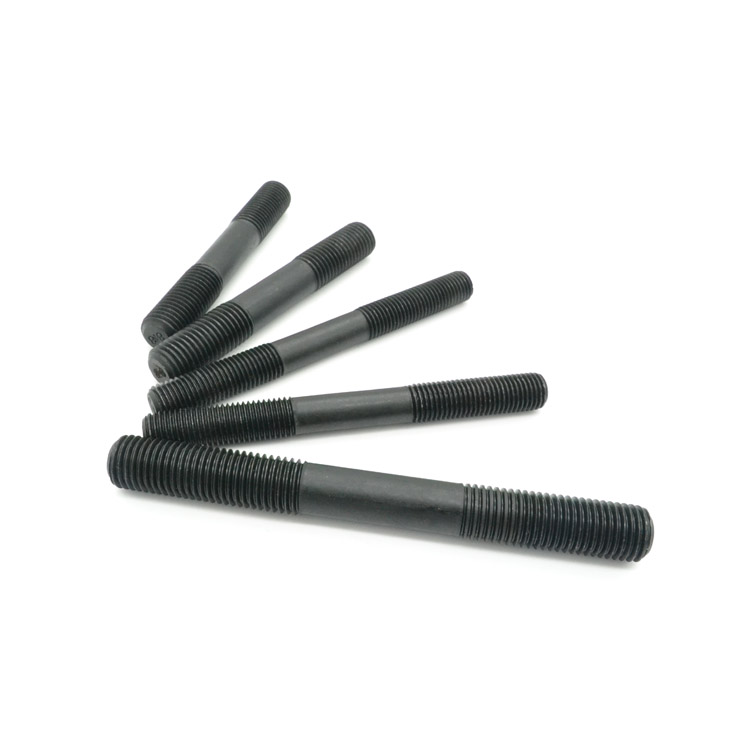Reliable Wire Bolts Suppliers | Quality Fasteners & Custom Solutions
Sep . 10, 2025 08:40 Back to list
Reliable Wire Bolts Suppliers | Quality Fasteners & Custom Solutions
Strategic Sourcing of Advanced Fasteners: Insights for B2B Procurement
In industrial applications demanding robust, reliable, and high-performance fastening solutions, the selection of appropriate components is critical. For complex engineering projects, identifying proficient wire bolts suppliers is paramount. This comprehensive guide delves into the intricate world of specialized fasteners, specifically focusing on Double End Stud Bolts, and provides B2B decision-makers with the expertise needed to navigate procurement, understand technical specifications, and leverage supplier capabilities for optimal project outcomes. Our analysis covers everything from manufacturing precision to real-world application advantages, ensuring a holistic understanding of the market.
The demand for high-integrity fastening solutions, particularly for critical infrastructure and heavy machinery, necessitates collaboration with wire bolts exporters who adhere to the strictest quality standards. This is not merely about sourcing components but about integrating reliable links into complex systems that must withstand extreme conditions and extended service lives.
Manufacturing Process Flow for Double End Stud Bolts
The production of Double End Stud Bolts, a flagship product among many offerings from leading wire bolts manufacturers, is a multi-stage process requiring precision engineering and stringent quality control. This ensures each bolt meets the demanding specifications for industries such as petrochemical, metallurgy, and water supply & drainage.
1. Material Selection & Cutting
High-grade alloy steels (e.g., B7, B16, L7 for high-temperature/low-temperature service) or stainless steels (e.g., 304, 316 for corrosion resistance) are sourced. Rods are cut to precise lengths, considering threading and overall stud dimensions. Materials are often certified to ASTM standards.
2. Forging & Forming
Depending on size and material, the blanks may undergo hot or cold forging to achieve desired head or specific end forms. This process enhances grain structure, improving mechanical properties and overall strength of the fastener. Precision is key to minimizing material waste and ensuring dimensional accuracy.
3. Thread Rolling/Cutting
Threads are typically roll-formed for superior fatigue resistance and strength, as opposed to cutting, which can disrupt grain flow. Both ends are threaded to specific standards (e.g., UNC, UNF, Metric coarse/fine pitch), ensuring compatibility with standard nuts. Roll forming results in a stronger, smoother thread surface, extending service life.
4. Heat Treatment
Critical for achieving desired mechanical properties such as tensile strength, yield strength, and hardness. Processes include quenching and tempering, carefully controlled to prevent decarburization or brittleness. Adherence to ISO 898-1 or ASTM F1554 standards is crucial.
5. Surface Treatment & Coating
To enhance corrosion resistance and reduce friction, coatings such as zinc plating, hot-dip galvanizing, PTFE coating (e.g., Xylan, Fluorokote), or black oxide are applied. Zinc plating is particularly common for applications requiring moderate corrosion protection, often found in zinc plated self drilling screws companies.
6. Quality Control & Testing
Each batch undergoes rigorous testing: dimensional inspection (ISO 2859-1), mechanical property testing (tensile, yield, hardness per ASTM E8, A370), non-destructive testing (MPI, Eddy Current), and coating thickness checks. Full traceability is maintained from raw material to finished product.

The meticulousness of this process ensures that each Double End Stud Bolt supplied by a reputable wire bolts supplier offers superior performance, extended service life (often exceeding 20-30 years in non-corrosive environments, and 10-15 years with proper coatings in harsher conditions), and significant advantages in target industries. For instance, in petrochemical applications, the corrosion resistance of coated studs prevents costly downtime and ensures safety. In water supply & drainage, their robust design withstands constant pressure and environmental exposure, leading to energy savings by preventing leakages.
Industry Trends and Market Dynamics
The global fastener market, valued at approximately $95 billion in 2022 and projected to reach over $130 billion by 2030, is driven by growth in infrastructure, automotive, and manufacturing sectors. Key trends impacting wire bolts companies include the increasing demand for high-strength, lightweight, and corrosion-resistant materials. There's a significant shift towards specialized fasteners that offer enhanced durability and performance under extreme conditions (high temperature, cryogenic, high pressure).
Furthermore, sustainability and environmental compliance are becoming crucial. Manufacturers are investing in eco-friendly coatings and optimized production processes to reduce waste and energy consumption. Digitalization, including advanced manufacturing techniques and smart inventory management, is also transforming the operations of leading wire bolts factories, enabling faster lead times and higher precision.
Technical Specifications and Performance Parameters
Understanding the technical specifications of Double End Stud Bolts is essential for proper selection and application. Parameters such as material grade, thread pitch, nominal diameter, overall length, and coating type directly influence performance.
Typical Specifications for Double End Stud Bolts (ASTM A193 B7)
| Parameter | Specification/Value | Standard |
|---|---|---|
| Material Grade | ASTM A193 Grade B7 (Alloy Steel, AISI 4140/4142) | ASTM A193 |
| Tensile Strength | Min 125 ksi (860 MPa) | ASTM A193 / A370 |
| Yield Strength | Min 105 ksi (725 MPa) | ASTM A193 / A370 |
| Hardness | 248-352 HB or 23-39 HRC | ASTM A193 / E10 / E18 |
| Operating Temperature | -20°F to 850°F (-29°C to 454°C) | Industry Standard |
| Thread Standard | ASME B1.1 (UNC, UNF) / ISO Metric | ASME / ISO |
| Common Coatings | Zinc Plating, Hot Dip Galvanized, PTFE (Xylan), Cadmium, Phosphate | ASTM B633, A153, D7681 |
| Sizes Available | 1/2" to 4" (M12 to M100) or customized | Manufacturer Specific |
The robust mechanical properties of ASTM A193 B7 material make it a preferred choice for high-pressure and high-temperature bolting in various industries, demonstrating the critical role of material science in fastener engineering.

Application Scenarios and Technical Advantages
Double End Stud Bolts are versatile fasteners critical for numerous industrial applications where two components need to be joined with a nut at each end, or where one end is permanently set and the other allows for maintenance.
- Petrochemical & Oil & Gas: Used in flange connections for pipelines, pressure vessels, and valves, where extreme temperatures, pressures, and corrosive media are common. Their resistance to creep and stress relaxation ensures joint integrity.
- Power Generation: Employed in turbines, boilers, and heat exchangers. Materials like ASTM A193 B16 are chosen for very high-temperature service, providing reliability in continuous operation.
- Marine & Offshore: Critical for securing structures and equipment exposed to saltwater and harsh weather, where specialized coatings (e.g., PTFE) offer superior corrosion protection, significantly extending asset life.
- Water Treatment & Desalination: Fastening pumps, filters, and piping systems. Stainless steel studs are preferred for their excellent resistance to aqueous corrosion.
- Heavy Machinery & Mining: Used in structural assemblies, engines, and heavy equipment where vibration resistance and high clamping force are required.
The technical advantages of procuring these fasteners from experienced wire bolts supplier include:
- High Clamping Force: Designed to provide superior clamping force, maintaining joint integrity even under dynamic loads and thermal cycling.
- Corrosion Resistance: Available with a range of coatings and materials, offering enhanced protection against various corrosive environments, which is crucial for prolonging asset lifespan and reducing maintenance costs.
- Temperature Stability: Materials like B7 and B16 maintain mechanical properties across wide temperature ranges, from cryogenic to elevated heat.
- Ease of Assembly/Disassembly: Double end design allows for easier tightening and removal, particularly in confined spaces, enhancing maintenance efficiency.
- Fatigue Resistance: Roll-formed threads contribute significantly to improved fatigue resistance, critical for applications involving cyclic loading.

Vendor Comparison: Selecting the Right Wire Bolts Company
Choosing among numerous wire bolts manufacturers requires a detailed evaluation beyond just pricing. Key factors include certifications, manufacturing capabilities, quality control processes, and customer support. Below is a comparative overview of what to consider when evaluating potential wire bolts factories.
| Criterion | Tier 1 Manufacturer (e.g., YZ Fastener) | Standard Manufacturer |
|---|---|---|
| Certifications | ISO 9001:2015, CE, PED (Pressure Equipment Directive), A2LA/NADCAP for testing. Full material traceability. | Basic ISO 9001. Limited material traceability. |
| Manufacturing Capabilities | Advanced CNC machining, cold/hot forging, roll threading, in-house heat treatment, comprehensive coating facilities. Large diameter and custom runs. | Standard machining, limited forging/rolling, outsourced heat treatment/coatings. Standard sizes only. |
| Quality Control & Testing | 100% visual inspection, extensive destructive/non-destructive testing (tensile, hardness, impact, MPI, UT), metallographic analysis. Statistical Process Control (SPC). | Batch testing, basic dimensional checks, minimal NDT. |
| Customization & R&D | Full engineering support, design collaboration, rapid prototyping, metallurgical expertise for bespoke solutions. | Limited customization for standard modifications. |
| Lead Time & Logistics | Optimized supply chain, global distribution network, expedited shipping options, inventory management programs. | Standard lead times, regional shipping. |
| Customer Support | Dedicated account managers, technical support engineers, after-sales service, detailed warranty. | Basic inquiry handling, limited technical assistance. |
Customized Solutions and Bespoke Engineering
Many projects require fasteners that deviate from standard specifications due to unique operational environments or structural requirements. Reputable wire bolts suppliers offer extensive customization capabilities, including:
- Material Alternatives: Beyond standard alloys, offering exotic materials like Inconel, Monel, or Hastelloy for extreme corrosion or high-temperature applications.
- Special Coatings: Custom-engineered coatings for specific chemical resistance, anti-galling properties, or enhanced friction coefficients. This includes advanced polymer coatings or specialized metallic platings.
- Unique Dimensions & Threading: Manufacturing bolts with non-standard lengths, diameters, thread pitches, or specialized end configurations to integrate seamlessly into proprietary designs.
- Integrated Solutions: Providing matching nuts, washers, and other components, often packaged as complete bolting kits, ensuring compatibility and reducing assembly time.
Collaborating with a wire bolts exporter capable of such bespoke engineering ensures that critical fastening requirements are met precisely, optimizing system performance and longevity.

Application Case Studies and Customer Success
Real-world applications underscore the value delivered by high-quality Double End Stud Bolts.
Case Study 1: Offshore Platform Flange Connections
A major oil & gas operator faced frequent corrosion-induced failures in flange connections on an offshore production platform. Standard galvanized bolts had a service life of merely 3-5 years, leading to costly shutdowns for replacement. After consulting with a specialized wire bolts supplier, they implemented Double End Stud Bolts manufactured from ASTM A320 L7M material with a Xylan 1070 PTFE coating. This combination provided superior resistance to saltwater corrosion and sulfide stress cracking. The new bolts have been in service for over 10 years without a single failure, drastically reducing maintenance costs by an estimated 60% and improving platform safety and operational uptime. Customer feedback highlighted the exceptional durability and reduced need for re-tightening after initial installation.
Case Study 2: High-Pressure Steam Turbine Assembly
A power generation plant required fasteners capable of withstanding continuous high temperatures (up to 550°C) and cyclical thermal stresses within their steam turbine assembly. Previous bolts experienced thermal creep and loss of preload, risking catastrophic failure. A leading zinc plated self drilling screws manufacturer, specializing in various industrial fasteners, provided custom Double End Stud Bolts in ASTM A193 B16 material, precisely heat-treated for optimal creep resistance. These fasteners, used in conjunction with matching heavy hex nuts (ASTM A194 Grade 4), maintained their structural integrity and clamping force under extreme conditions, extending the operational interval between maintenance checks by 25% and enhancing overall plant efficiency.
Trustworthiness and Support: FAQ, Lead Times, Warranty, and After-Sales
Establishing trust with B2B clients involves transparent communication regarding product quality, delivery, and support.
Frequently Asked Questions (FAQ)
Q: What materials are available for Double End Stud Bolts?
A: We supply a wide range of materials including ASTM A193 B7, B16, L7, B8/B8M (stainless steel 304/316), and exotic alloys like Inconel and Monel, tailored to specific application requirements.
Q: Can you accommodate custom dimensions and specifications?
A: Absolutely. Our engineering team specializes in custom solutions, from unique lengths and diameters to specialized thread forms and material grades. Please provide your drawings or requirements for a detailed quote.
Q: What are your typical lead times?
A: For standard products, lead times typically range from 2-4 weeks. Custom orders may take 4-8 weeks depending on complexity and material availability. Expedited options are available upon request for urgent projects.
Lead Time and Fulfillment
Our streamlined production and robust supply chain management enable efficient order fulfillment. We maintain a substantial inventory of raw materials and standard finished products to minimize lead times. For large-scale or complex projects, we collaborate closely with clients to establish phased delivery schedules that align with project timelines, offering just-in-time (JIT) options where feasible. Our global logistics partners ensure reliable and timely delivery worldwide.
Warranty Commitments
All products are manufactured to stringent international standards (ISO, ASTM, ANSI) and undergo rigorous quality control. We offer a comprehensive warranty against manufacturing defects and material non-conformity for a period of 12 months from the date of shipment or 18 months from the date of production, whichever comes first. This commitment underscores our confidence in the quality and durability of our fasteners.
Customer Support and After-Sales Service
Our dedication extends beyond delivery. We provide dedicated technical support through experienced engineers who can assist with product selection, application guidance, and troubleshooting. Post-delivery, our customer service team is readily available to address any inquiries, ensuring complete client satisfaction and long-term partnership.
References
- ASTM International. "Standard Specification for Alloy-Steel and Stainless Steel Bolting Materials for High-Temperature Service." ASTM A193/A193M.
- ISO (International Organization for Standardization). "Fasteners - Mechanical properties of fasteners made of carbon steel and alloy steel - Part 1: Bolts, screws and studs with specified property classes - Coarse thread and fine pitch thread." ISO 898-1:2013.
- ASME (American Society of Mechanical Engineers). "Unified Inch Screw Threads (UN and UNR Thread Form)." ASME B1.1.
- Mordor Intelligence. "Fasteners Market - Growth, Trends, COVID-19 Impact, and Forecasts (2023-2028)." Market Research Report.
- NACE International (now AMPP). "Material Requirements for Sulfide Stress Cracking and Stress Corrosion Cracking in Sour Oilfield Environments." NACE MR0175 / ISO 15156.
Latest news
-
Elevator Bolts – Durable Conveyor & Industrial Fasteners | YZ Fastener
NewsNov.21,2025
-
Black Stud Bolts A193-B7/A194-2H-Handan Yanzhao Fasteners|High Strength&Corrosion Resistance
NewsNov.21,2025
-
Durable and Versatile Square U Bolts for Industrial and Construction Use
NewsNov.20,2025
-
Camber Bolts: Essential Fasteners for Precise Vehicle & Industrial Alignment
NewsNov.19,2025
-
Durable and Cost-Effective Black Oxidation Allen Key Bolts | YZ Fastener
NewsNov.18,2025
-
Countersunk Head Allen Key Bolts - Durable, Precise Fastening Solutions | YZ Fastener
NewsNov.17,2025
